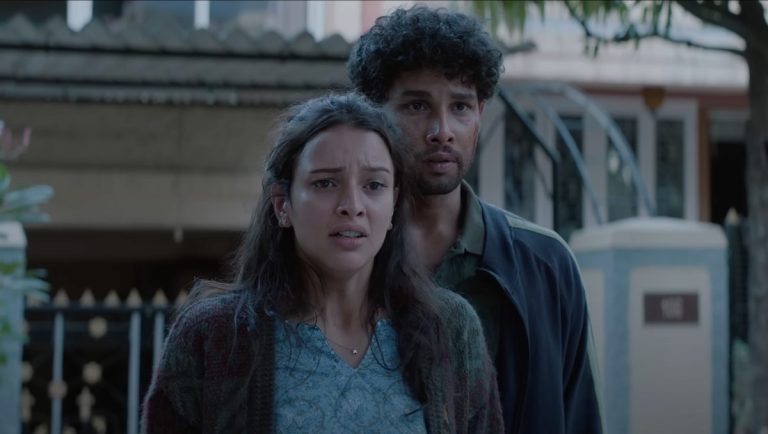Amazon Prime dropped its much-awaited release Sherni (2021), starring Vidya Balan, on the 18th of June, and ever since the film has garnered a lot of applause. Directed by Newton famed director Amit Masurkar, Sherni portrays the conflict between man versus wild. The story focuses on man-animal affray with the help of a linear narrative- As the new DFO (Divisional Forest Officer) is transferred to a village in Madhya Pradesh, a search for a man-eating tigress begins who is on the prowl in the neighboring jungles.
Sherni is the story of the tigress T12 who roams the jungles and hunts humans and their livestock, and also the story of Vidya Vincent (Vidya Balan) who is on the hunt to capture and transfer this tigress alive to the nearby National Sanctuary. While she is on and about her job, several factors prop up and try to create a hurdle for her. These impediments include contending opposition parties, local goons, fervent hunters, and corrupt higher authorities. The film is supposedly a war between the quoted factors and Vidya, where Vidya is expected to battle each of these bravely but sadly enough, she is only seen as a silent bystander at most times.
Related to Sherni (2021): Newton (2017): The Story of a Forgotten Community
With a bland preface and credit role, the opening scene features forest officials setting up traps and CCTV cameras for the tigress. One officer, on all fours, is helping the others deduce the height of the animal for the cameras to catch the footage. This is a very early example in the film where Masurkar has tried to draw a parallel between animals and mankind. It can be said that the filmmakers have tried to blur the lines between the two and subtly tried to showcase how man is equally barbarous, if not more. More on that later.
Ostensibly an environmental thriller, Sherni (2021) is a definite comment on environmental degradation. A certain dialogue in the film goes to say, ‘Sher hain to jungle hai, jungle hain to baarish hain, baarish hain to paani hain aur paani hai toh hum hain’. Full points for the director to infuse these messages very subtly in the film without making it preachy or priggish. However, at the same time, it cannot be denied that Sherni is a film for a very niche audience. The initial scenes falsely give the impression that something big, something interesting is intended to happen soon. But the lack of a hook, plot or a worthy climax makes the story drab and lackluster for the regular audiences. Further, the documentary-like filming and long, boring sequences of the jungle make it very one-direction, prosaic, and an extended episode of Man v/s Wild.
The lack of a proper structure makes Sherni (2021) a banal affair where the build-up lasts for more than an hour and a half only to result in a below bog-standard climax. The climax is so uneventful that it won’t be wrong to say that it takes away a lot from the title itself. Thankfully, at the brink of the climax is placed the song ‘Bandar Baant’ which infuses some spirit into the nondescript storyline.
Quite true to expectations, Vidya Balan has outdone herself and undeniably nailed the role of the Forest Officer in the skin of Vidya Vincent. The identities of the characters are a step in the right direction of communal harmonies and therefore, deserve to be acknowledged. The genesis of Vidya Vincent- a South Indian Christian protagonist, reminds us that India is still a secular country and leads us to think away from the monochrome picture of Hindu-Muslim territory even for a minute. Hassan Noorani (played by Vijay Raaz) reminds us that we can still talk about Muslims in India without the mention of terrorism, politics, or a desperate attempt at showcasing secularism.
Delving further into the character of Vidya Vincent, it wouldn’t be wrong to say that while she was originally conceptualized to draw a parallel between a tigress and herself, it wasn’t a win-all successful attempt. Masurkar has tried to juxtapose the resilience, perseverance, and patience of Vidya Vincent with that of the real tigress T12. They have tried to eschew from showing her as someone who is brusque, roars, and uses her powerful stature into making people fearful of her and thus making them execute her orders. But that angle to the character is unfleshed and not properly tapped into. Vidya has grit and moral fiber, but that tenacity is not enough to effectuate the mission with impactful results. The filmmakers cannot expect the audiences to sit through a 130 minutes film without a satisfactory climax. They have even tried to redeem and reassert her disposition in the last scene where a new officer comes to replace her- the first scene with Vidya is replayed but with different intentions. It is a comment on how the system fails to recognize the caliber of honest officials.
Related List: 10 Best Hindi Films of 2020
Coming back to the narrative, Masurkar has gone back and forth with the subtle infusion and assertion on how we need to protect our environment and also on how we, as humans, are turning to be more barbaric and brutal than wild animals. The latter message is best imparted by the character of Pintu Bhaiya (played by Sharat Saxena). He is so blinded in his love of hunting animals, that he fails to see how he is murdering innocent animals. Furthermore, the news channels in the film (and also the characters) call the tigress ‘nirdayi aadamkhor’ (ruthless man-eater) while they fail to realize that the poor animal is just hunting for survival whereas, in actuality, they are ‘ruthless murderers’ who kill them for fun, when they can easily trap them and send them to live off in sanctuaries.
Brijendra Kala as Bansal was a whiff of fresh air, full of punches and light-hearted comic scenes. Sampa Mandal as Jyoti made her mark, even though she remained a sidelined character throughout. The characters of Ila Arun, Suma Mukundan, and Mukul Chadda (as Pawan’s mother, Vidya’s mother, and Pawan respectively) were bearable. Masurkar tried to bring in a different context to the story through these characters to showcase the internal family struggles of high-rank officials. He tried to show a personal side to Vidya’s characters but the theme remained half-hearted and unexplored. Neeraj Kabi as Nangia was his usual best in portraying the role of a confused officer siding with corrupt officers.
To conclude, Sherni (2021) is not a gripping drama in any sense. If at all, it is a recurring set of jungle scenes with a group of people on the hunt for an animal. But it does have exquisite and remarkable performances, calming greenery scenes, and a full-fledged environmental message. A chilling reminder of it comes halfway into the film when a forest official says, ‘Agar aap jungle me 100 bar jayengi to ho sakta hai tiger aapko ek bar dikhe…parantu ek baat to tay hai ki tiger ne aapko 99 baar dekh lia’. Essentially meaning that it is not them but us, who are intruding into their territory.



![Rome, Open City [1945] Review – A Powerful Lament on the Quiet Defiance of War-Afffected Italians](https://79468c92.delivery.rocketcdn.me/wp-content/uploads/2020/01/Rome-Open-City-1945-768x432.jpg)




